Proficiency in multiple languages is a valuable skill for both individuals and businesses. Online language assessments play a vital role in evaluating and certifying language proficiency in a structured and scalable way. Whether in recruitment for multilingual roles or in education to measure students’ progress in foreign language learning, these assessments provide a reliable measure of linguistic competence. We’ll explore how delivering language assessments online can streamline the process, improve accessibility, reduce administrative burden, and provide faster, more accurate results. We will also highlight the key features that make these assessments both effective and scalable.
What are language assessments?
Language assessments are designed to measure an individual’s ability to understand and use a specific language. They typically include tests for reading, writing, speaking, and listening skills, ensuring a comprehensive evaluation of language proficiency. Delivering them online provide a flexible and accessible alternative to traditional in-person exams, allowing test-takers to complete these assessments remotely.
Who are language assessments for?
Language assessments aren’t just for students - they’re a crucial tool across many industries where clear communication is essential. Whether you're hiring, training, or certifying individuals, evaluating language skills helps ensure better performance, safer interactions, and stronger customer experiences. Here are some of the key groups that rely on language assessments:
- Interpreters and translators: Professionals must be highly proficient in multiple languages to ensure accurate, culturally appropriate translations. Language assessments verify their fluency, vocabulary, and ability to handle specialised content (e.g., legal or medical), ensuring the original meaning is preserved.
- Customer service representatives: In hotels, call centres, and retail, staff often serve multilingual customers. Language assessments confirm their ability to communicate clearly, listen effectively, and respond appropriately in multiple languages, improving customer satisfaction and service quality.
- Teachers and educators: Language skills are vital for teaching languages or working abroad. Assessments ensure teachers can instruct, assess, and communicate effectively. For language teachers, they also confirm grammar, pronunciation, and vocabulary knowledge needed for high-quality education.
- Healthcare professionals: Clear communication is essential for accurate diagnosis and care. Language assessments help confirm that medical staff can understand patients, explain procedures, and use appropriate terminology, ensuring safe and effective care for diverse populations.
- Government and immigration officers: These roles require precise, formal communication with people from various backgrounds. Language assessments validate the officer’s ability to conduct interviews, explain policies, and handle official documents accurately, which is often a job or visa requirement.
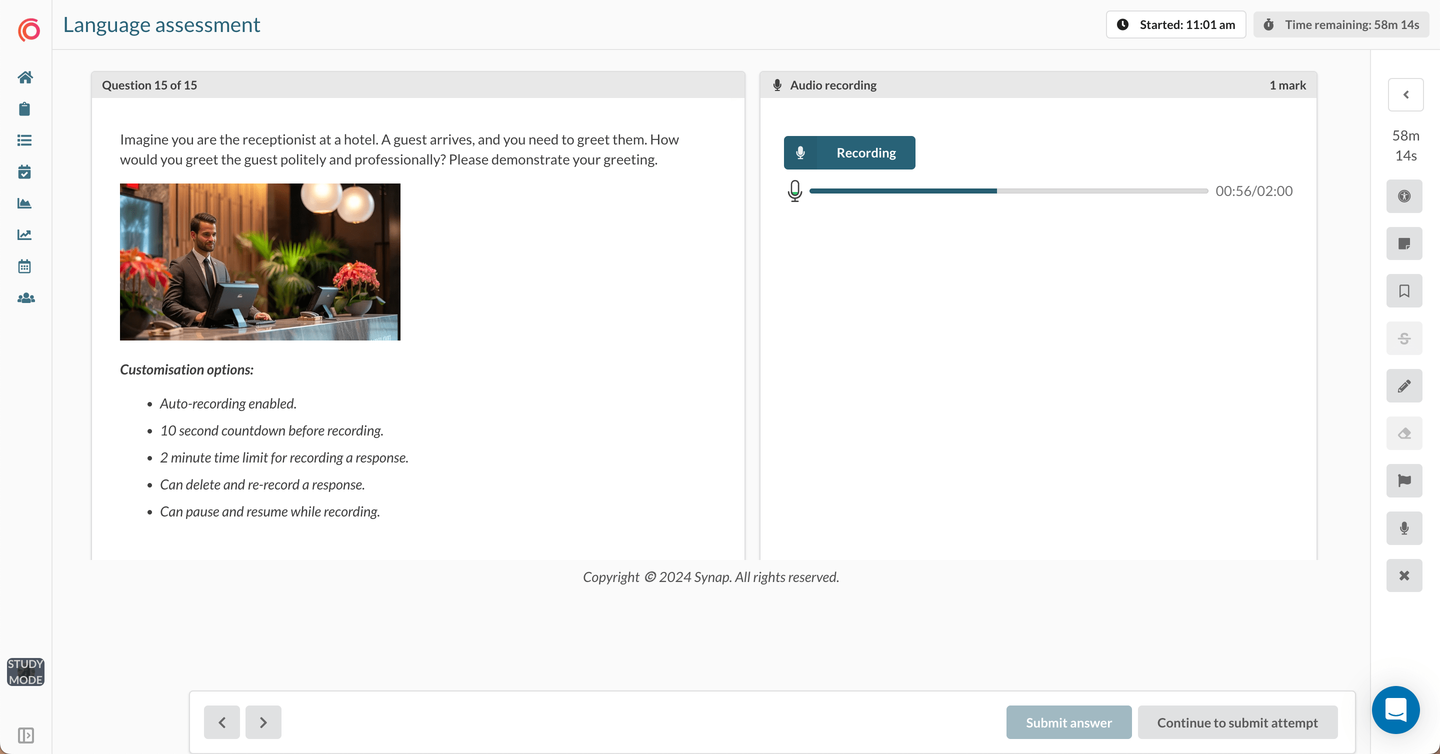
What are the benefits of delivering language assessments online?
Delivering language assessments online offers numerous advantages, making the process more efficient, accessible, and cost-effective. These benefits go beyond convenience, offering automated grading, multimedia integration, and scalability, contribute to a more accurate, flexible, and user-friendly process.
Flexible and scalable
Online assessments provide flexibility by allowing candidates to test remotely, making scheduling easier and increasing participation. They also provide the ability to scale effortlessly, accommodating large volumes of candidates across multiple locations, ideal for recruitment, academic testing, or training, all while maintaining accuracy and security.
Rich multimedia integration
Online exam solutions support a variety of question formats, including audio and video elements, to create a more engaging assessment experience. By simulating real-world scenarios, such as listening to a customer service call or responding to a mock job interview, candidates can more accurately demonstrate their language skills in practical contexts.
Reduced administrative burden
Online exam solutions automate the entire process, from test delivery to grading and reporting. Automated grading for reading, listening, and writing eliminates manual marking, while recorded speaking assessments reduce the need for live examiners ultimately saving time and resourses.
Cost savings
Delivering language exams online reduces the expenses associated with in-person testing, such as venue hire, printed materials, and examiner fees. By transitioning to digital assessments, organisations can save significant operational costs while maintaining high testing standards.
Accessibility for all candidates
Built-in accessibility tools such as screen readers, adjustable text sizes, and language support help to accommodate diverse test-takers. These enhancements ensure that candidates with disabilities or language barriers can take the assessments with ease.
Key features of online language assessments
Assessing reading skills
Evaluating reading skills involves assessing comprehension of written texts, including grammar, vocabulary, and the ability to understand context.
- Multiple-choice comprehension: Evaluate candidate’s ability to identify main ideas, details, and inferred meanings.
- Cloze question types (fill in the blank, drag and drop, drop-down):Test vocabulary and grammar skills by requiring candidates to accurately complete sentences using correct words or phrases.
- Extended Matching Questions (EMQs):Use a shared passage or question stem to assess comprehension through multiple related questions, providing a deeper evaluation of reading skills.
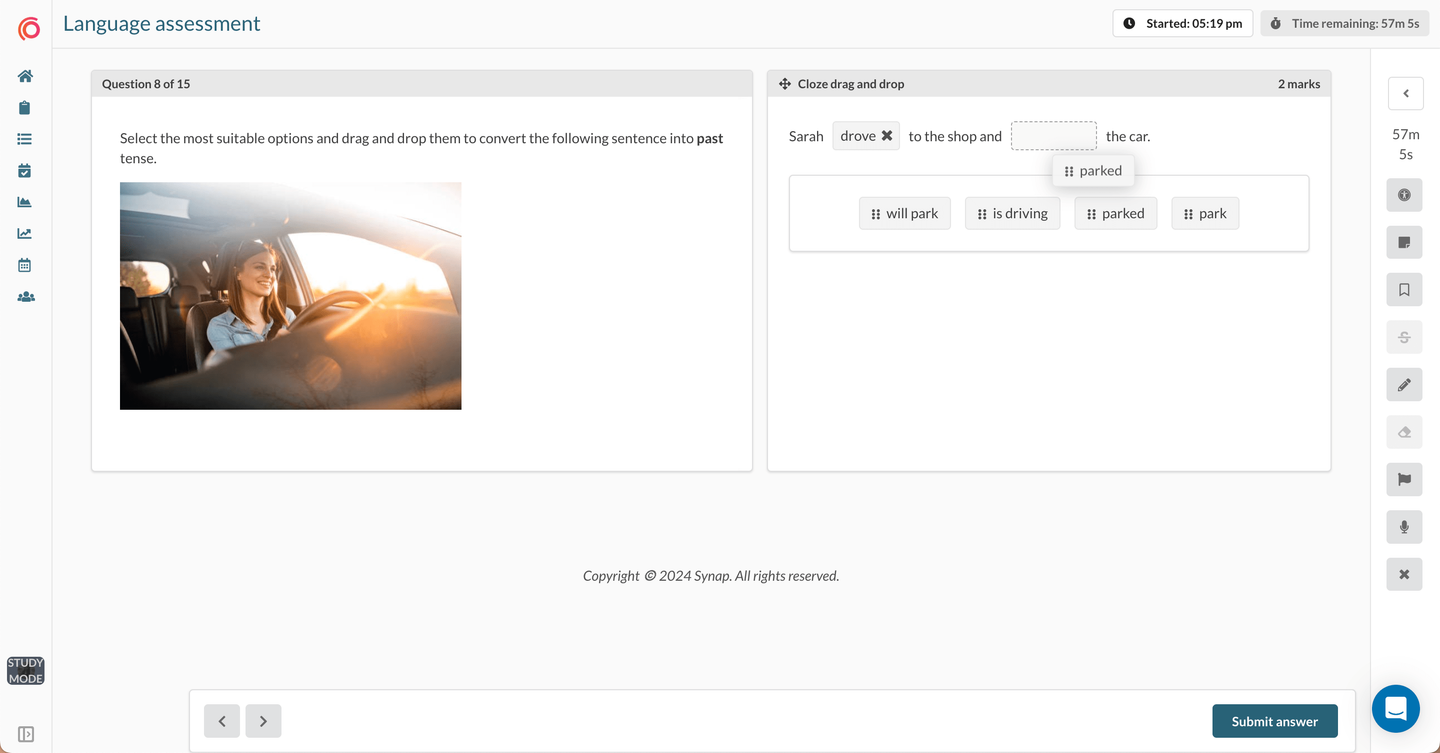
Assessing writing skills
Writing skills are measured by the ability to construct coherent, grammatically correct responses, essays, or structured answers.
- Short-answer prompts: Require candidates to provide responses that test coherence, structure, grammar, and vocabulary in focused writing tasks.
- Free text answers: Allow candidates to provide open-ended responses without predefined options, ensuring a natural evaluation of written expression.
- Automated grading: Automatically marked question formats, like drag-and-drop and fill-in-the-blank are marked instantly, saving valuable time and delivering consistent results.
- Rubric marking: Add your own mark scheme to grade responses by criteria such as grammar, spelling etc.
- Marking dashboard: Mark written and audio responses in one place to seamlessly coordinate grading and automatically calculate overall grades.
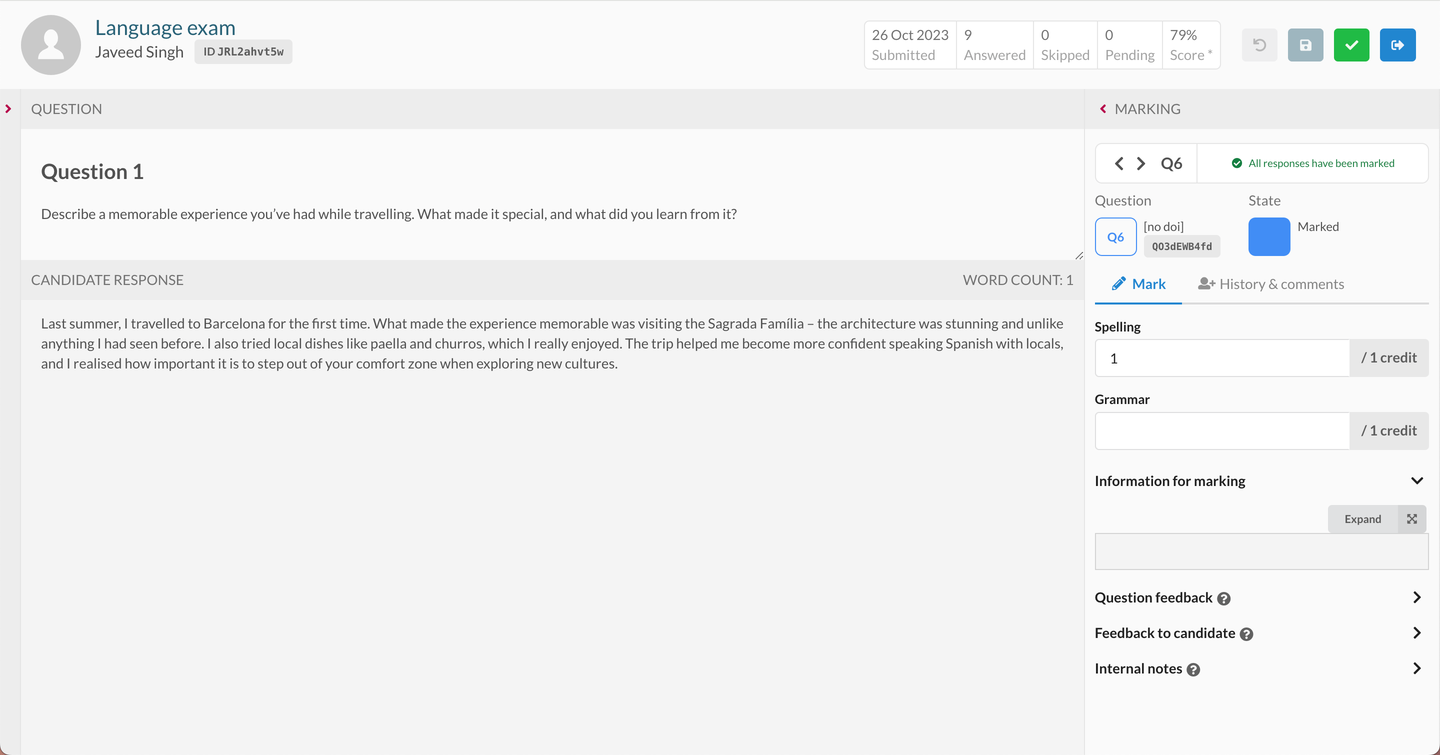
Assessing speaking skills
Speaking assesses pronunciation, fluency, and verbal communication skills through recorded or live interactions.
- Audio recorded answers: Capture candidate’s spoken responses for evaluation. Set time limits on how long the recording can be and choose whether they can delete and re-record or submit only once.
- Video recorded answers: Go a step further to capture fluency, body language, and confidence. Capturing facial expressions and posture contribute to communication effectiveness, especially in real-world speaking contexts.
- Scenario-based speaking tasks: Simulate real-life situations such as workplace discussions or customer interactions., requiring candidates to respond naturally in different contexts.
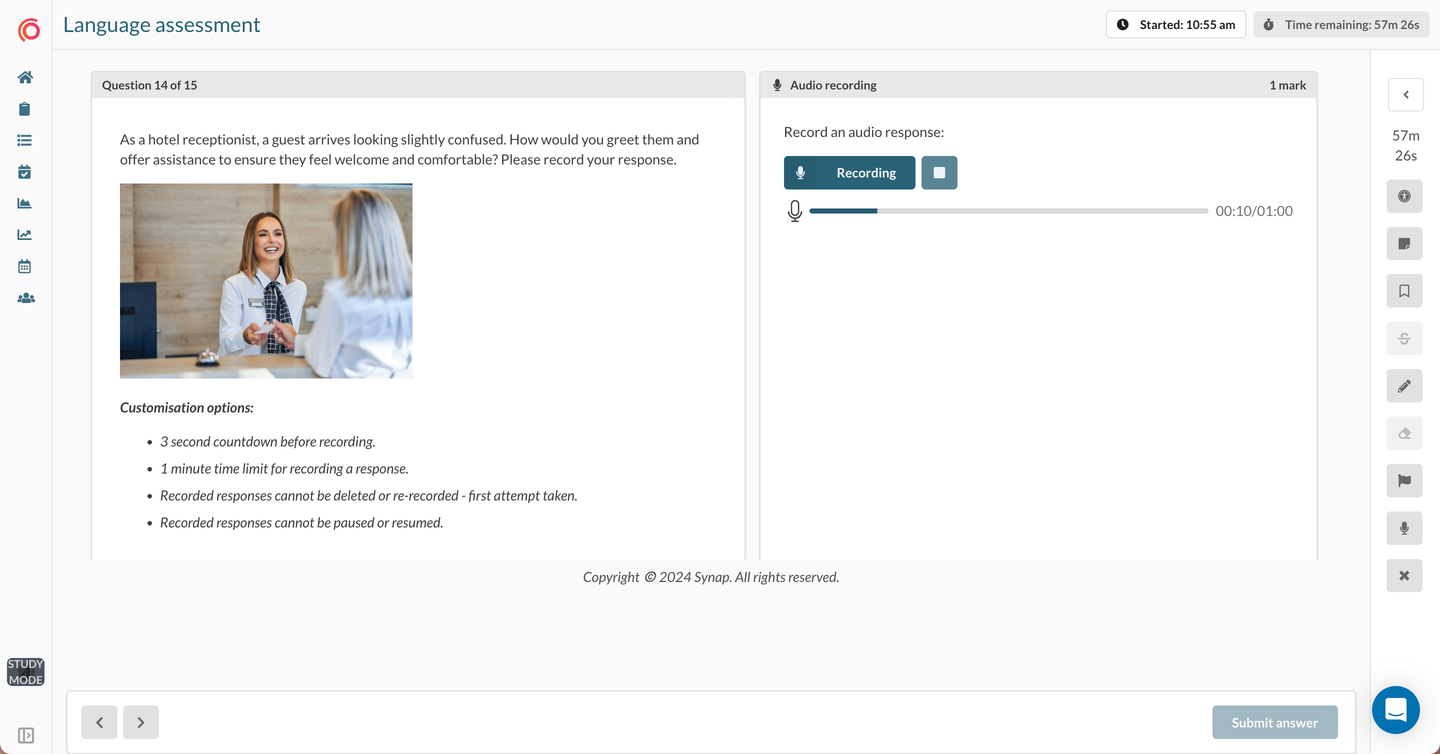
Assessing listening skills
Listening tests the ability to understand spoken language in different contexts, from casual conversations to professional dialogues.
- Audio and video questions: Embed spoken content in different formats (conversations, monologues, etc.) to evaluate comprehension and engagement.
- Advanced playback controls:
- Restrict playback count: Limit how many times the user can replay the audio/video to simulate real-world listening conditions.
- Auto-play on question display: Media start automatically when the question appears, ensuring a seamless testing experience.
- Disable progression until played: Prevent guessing by ensuring candidates listen to the full content before proceeding onto the next question.
- Hide answer options until played: Encourage active listening by displaying answer choices only after the media has been played.
- Delay question stem: Keep focus on the listening task before showing the related question after a short pause.
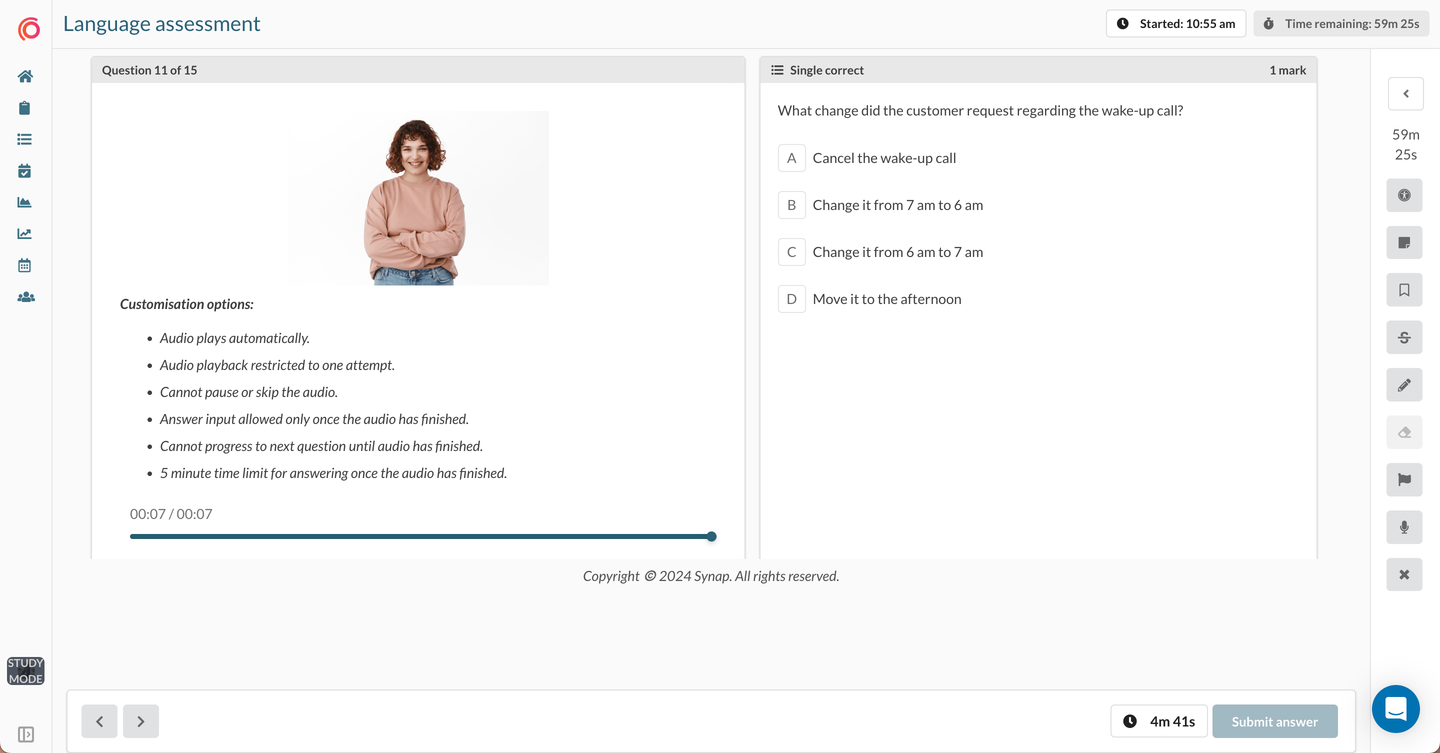
Conclusion
Delivering language assessments online offers significant advantages for organisations and candidates. The combination of automation, scalability, and instant results reduces administrative burden and improves efficiency. Adding multimedia to questions enhances engagement, and accessibility features ensure inclusivity for learners. With cost savings, flexible scheduling, and automatic grading, online assessments provide a seamless, data-driven approach to language evaluation, making them an essential tool for modern education, recruitment, and professional development.
Ready to upgrade your online language exams?
See how Synap can can transform your language assessments - book a tailored demo and start your 14 day free trial today.



